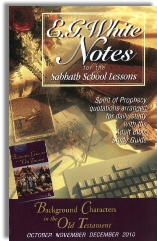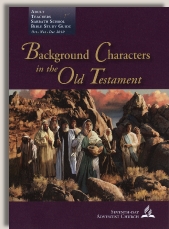|
||||||||||||||
Commentary on "Rizpah: The Influence of Faithfulness"
Day 5: Wednesday, November 24, 2010 - Faithfulness Is a Way of Life
Overview
The Lesson briefly summarizes how David consented to the demands of the Gibeonites, and seven sons of Saul are found. A certain kind of “Atonement” is to be achieved through their deaths. Although David’s Hebrew word for atonement is linked with the Day of Atonement in Leviticus 16, no further explanation is given as to its real meaning on this occasion.
The two sons of Rizpah and her deceased husband Saul are selected for execution. The Lesson then asks how we can understand this, or if it is even possible to understand this disturbing picture of “atonement.” Is this another thing where we must just trust the Lord? The Lesson does not provide answers to these questions.
Rizpah’s sad vigil over the bodies of her sons is recounted, and she is again held up as an example of faithfulness in a story dominated by many unfaithful men.
Observations
No one can read this short story, told in just 14 verses, without being moved with the horror, or without asking hard questions. The Lesson asks the readers to consider some questions, but seems distinctly uncomfortable with this story and its implications. Rather than avoiding the discomfort, we can be confident that God has given this story in His Word for our benefit, so we should be obedient and dig deeper.
One hard question we encounter is, why were the sons punished for Saul’s sins? Saul was already dead, but the Gibeonites demanded the deaths of seven of Saul’s family members. We do not know how these sons or grandsons may have been involved in the atrocities. The Law specifically forbade Israel from punishing the sons for the sins of their fathers (Deut. 24:16). How then can this be considered lawful, or just?
As we have seen, God had said the famine was for “Saul and for his bloody house,” indicating this was familial guilt. Not only did the sons somehow participate in the crimes, but the family was involved and entangled in other ways. Murder, treachery, and breach of covenant were the very spirit of the house of Saul (Matthew Henry, 1998). This was confirmed for us in the manner in which Saul and his sons were killed in battle with the Philistines, and later, the bodies of all three were hung up on a wall in disgrace. Samuel had prophesied their deaths the night before as a consequence of Saul’s disobedience, so we can see God’s hand of justice at work. We know this was Samuel, because everything he said about Saul’s disobedience was accurate, and his prophecy of the battle also came true.
Saul became a curse in Israel, and In I Chronicles 10:13, we are given the reason for his death:
“So Saul died for his breach of faith. He…did not keep the command of the Lord, and also consulted a medium, seeking guidance. He did not seek guidance from the Lord.”
We must consider that Israel’s God had taken such a personal stake in the cause of the Gibeonites as both advocate and judge, that this was an extraordinary legal case. Yahweh Himself was guaranteeing the integrity of the Gibeonite covenant, and He was not subject to the same laws he gave the Israelites. Though he forbade the Israelites from punishing the sons for the father’s sins, God reserves His divine right to punish children for sins of fathers to third and fourth generations of those that hate Him (Ex. 20:5). Famine and death are terrible tools of discipline and justice to use at His discretion. Though His ways are right, they are not subject to our judgments, for He is Lord of His own laws.
“I form light and create darkness, I make well-being and create calamity, I am the Lord who does all these things.” Isaiah 45:7
“Who has measured the Spirit of the Lord, or what man shows him his counsel?...Who taught him the path of justice, and taught him knowledge?” Isaiah 40:13,14
Was there a procession of the condemned with a crowd of onlookers? Did the prisoners resist? Did Rizpah see her sons die? We are not told these details, and the Biblical writing does not try to satisfy our curiosity. The text simply tells us that the king,
“…gave them into the hands of the Gibeonites, and they hanged them on the mountain before the Lord, and the seven of them perished together.” II Samuel 21:9
Hanging a body from a tree was a most shameful spectacle and the most dreaded end, for all such men were declared cursed by God. The executions were held just outside the city, Gibeah of Saul. It is very likely that Rizpah was there, as were her other family and neighbors. She was certainly present afterward to build herself a little tent of sackcloth and camp there to protect the bodies from bird and beast.
While we might wish to turn away from this terrible scene, we need to be reminded of the horrors that Saul and his family had perpetrated on the nation. The priests of Nob, who had helped David while he was hiding from Saul, provide one example. One of Saul’s more odious subjects, Doeg the Edomite, happened to be present when David came to the temple of God in Nob (I Sam. 21). David asked for food and aid for his men. The priests gave them the holy bread, and gave David the sword of Goliath. When Saul heard of this from Doeg, he called them into his presence to confront them. When his own guards refused to lay a hand on the men of God, he commanded Doeg to kill them. All 85 priests were murdered in Saul’s presence, and later, all the inhabitants of the city of Nob (I Sam. 22).
There are many ugly stories in the Bible, and this is one of the most gut wrenching. The Lesson refuses to say that God inspired or approved of this seemingly “barbaric” act, and excuses David by saying, “he was trying, within his contemporary cultural milieu, to repair a breach of faithfulness occasioned by Saul.” The Lesson appears to believe that God shares their disdain for such brutal methods of justice. Uglier still are the many sins of the house of Saul that had brought all Israel under God’s judgment, and that cried out for atonement. Thousands of families had been devastated by his betrayal of the nation’s trust, and of his God who appointed him king.
What does the “modern mind” think would have satisfied the victims of Saul—or of God? Would monetary compensation or heartfelt apologies be sufficient? Perhaps time would heal the wounds. Israel and her king hoped the atrocities in Gibeon and Nob could be forgotten, but God never forgot. Only the shedding of blood could atone for the bloody sins of the house of Saul. It is significant that Saul and nearly all of his sons ended their lives as cursed by God and man, and hung up for display. The sheer brutality of this story provides an example of the true cost of our sin. Forgiveness does not come cheaply through a capricious act of God. The measure of guilt is not found in our feelings of justice, but in God’s heart.
Summary
- The entire house of Saul was responsible because unfaithfulness and murder were the very spirit of his family.
- God’s displeasure with Saul and his family was shown by hanging the dead bodies.
- God reserves His exclusive rights to use Famine and death as terrible tools of discipline and justice. His decisions are not subject to our judgments.
- Forgiveness of sin is not a capricious act of God, but an expensive act requiring blood.
- Guilt is not measured by our feelings, but by God’s heart.
Copyright 2010 BibleStudiesForAdventists.com. All rights reserved. November 23, 2010. This website is published by Life Assurance Ministries, Glendale, Arizona, USA, the publisher of Proclamation! Magazine. Contact email: BibleStudiesForAdventists@gmail.com.
The Sabbath School Bible Study Guide and the corresponding E.G. White Notes are published by Pacific Press Publishing Association, which is owned and operated by the Seventh-day Adventist church. The current quarter's editions are pictured above.
Official Adventist Resources
Standard Edition Study Guide Week 9
Teacher's Edition Study Guide Week 9
Easy Reading Edition Study Guide Wk 9
Search the Complete Published Ellen G. White Writings


